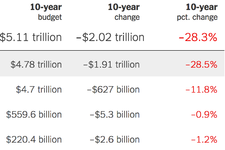 |
| A health worker testing a patient for H.I.V. in Homa Bay County, Kenya. Simon Maina / Agence France-Presse — Getty Images |
By GARDINER HARRIS
May 23, 2017
____________________________________________________________________________________
WASHINGTON — At least one million people will die in
sub-Saharan Africa and elsewhere, researchers and advocates said on
Tuesday, if funding cuts proposed by the Trump administration to global
public health programs are enacted.
The United
States currently spends more than $6 billion annually on programs that
buy antiretroviral drugs for about 11.5 million people worldwide who are
infected with H.I.V.,
the virus that causes AIDS. The Trump administration has proposed
slashing those programs by at least $1.1 billion — nearly a fifth of
their current funding, said Jen Kates, a vice president at the Kaiser
Family Foundation.
“These are lifesaving
interventions, and these levels of reductions will significantly curtail
service delivery,” Ms. Kates said.
In a briefing
for reporters, Hari Sastry, director of the State Department’s Office of
U.S. Foreign Assistance Resources, said that everyone now receiving
drug treatments under the programs would be allowed to continue, even if
the funding cuts were approved.
“We will currently maintain those patients on the
treatment,” Mr. Sastry said. He did not explain how that would happen if
funding dropped by roughly 20 percent, but the programs have wide
bipartisan support on Capitol Hill, where they may be shielded from the
proposed cuts.
Much
of the success of anti-AIDS efforts in Africa has come from a guarantee
in many countries that people who test positive for H.I.V. can
immediately receive treatment.
With a huge share
of Africa’s population reaching sexual maturity in the next four years,
the virus could again imperil much of the continent if fewer people are
treated, said Brian Honermann, deputy director at amfAR, a foundation
that invests in AIDS research.
___________________________________________________________________________________
 Interactive Graphic | How Trump’s Budget Would Affect Every Part of Government Government spending would be cut substantially. See how every budget item would be changed.
Interactive Graphic | How Trump’s Budget Would Affect Every Part of Government Government spending would be cut substantially. See how every budget item would be changed.
___________________________________________________________________________________
AIDS treatment not only keeps people alive but
prevents them from spreading the virus to others, Mr. Honermann noted.
“If you cut the funding by this much, I think there’s a real risk we
will backslide, and a whole lot more people will become infected,” he
said.
Much of the United States government’s
funding for AIDS treatment and research is funneled through the
President’s Emergency Plan for AIDS Relief, or Pepfar, which was
established in 2004 by President George W. Bush in an effort to save
Africa from an epidemic that threatened to kill much of the population
of entire countries, like Botswana and Namibia.
President
Barack Obama expanded Pepfar, and combined with the Global Fund and
other international efforts, the spending is widely credited with
arresting the AIDS epidemic. About 37 million people worldwide
are infected with H.I.V., including nearly two million children. About
one million people died of AIDS in 2015, and two million were newly
infected that year.
Pepfar funds anti-AIDS
activities in more than 60 countries. But in the briefing on Tuesday,
Mr. Sastry said the Trump administration planned to ensure that the
United States was “focusing our efforts in the 12 high-burden countries
to achieve epidemic control.”
He did not name those 12 countries, but in past years, the program focused much of its work on a dozen African countries, as well as Haiti, Vietnam and Guyana.
The
Trump administration has also proposed eliminating $524 million in
funding for contraceptives and other family planning efforts that mostly
benefit women in developing nations.
Melinda Gates, co-founder of the Bill & Melinda Gates Foundation, said in a statement posted on her Facebook page that the proposed family planning cuts “would lead to more unintended pregnancies, more maternal deaths.”
“This budget threatens to trap millions more families in a cycle of poverty,” she said.
It
is unclear how many lives could be lost as a direct result of the
budget cuts, but the Global Fund estimates that every $100 million
invested saves about 133,000 lives. An amfAR calculation
found a similar effect, suggesting that the administration’s proposed
cuts to AIDS programs alone could cost more than one million lives and
orphan more than 300,000 children.
“All of these
programs have multiplier effects beyond just those immediately served by
them,” said J. Stephen Morrison, who directs global health work at the
Center for Strategic and International Studies. “For the first time
ever, after 15 years of steady growth, we’re going to see a radical
regression that will have huge effects.”
Read more articles from the New York Times, here.
No comments:
Post a Comment
Note: Only a member of this blog may post a comment.